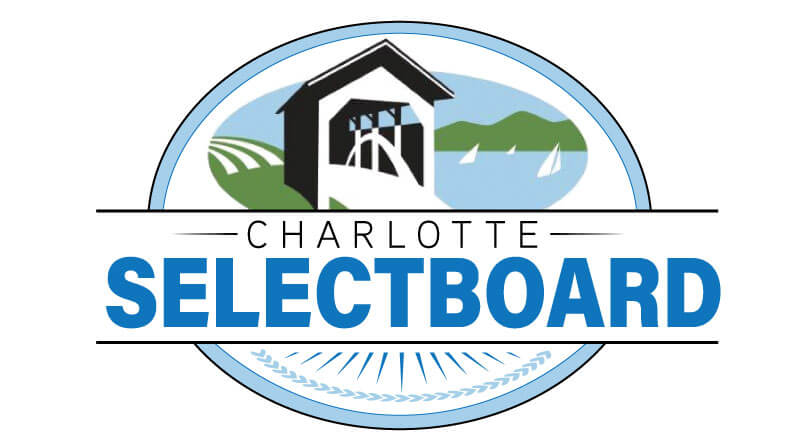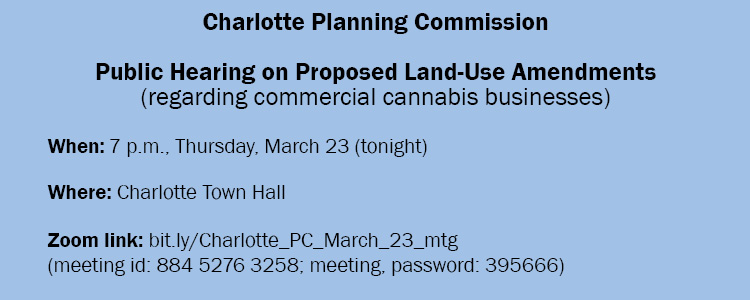Cannabis cultivation causes confusion
(This story has been changed to correct that Kelly Devine’s motion to approve “the application for a mixed cultivator Tier 1 license by Vermont Cultivars” was not defeated. The motion was not seconded, so it was tabled to be decided at a later meeting.)
Confusion, frustration, possibly even anger, has been stirred up in Charlotte over the regulation of commercial cannabis operations in town.
On March 13, the Charlotte Selectboard, operating as the town’s cannabis control commission for the purpose of considering an application for cannabis cultivation, found itself wrestling with questions for which it found no clear answers.
And the members found their discussion stymied by state restraints restricting what they could say about such applications.
The application in question was approved on the town level by former zoning administrator Keith Oborne, whose last day of work was Friday, March 17, and now it was before the selectboard for its approval..
Town planner Larry Lewack said Oborne left to take a position as planning and zoning administrator for the town of Richmond.
 Some members of the board expressed frustration that it seemed like the only option they had was to rubber-stamp the application and send it back to the state. After the application was approved by Oborne, the 15-day appeal period had passed without an appeal being filed.
Some members of the board expressed frustration that it seemed like the only option they had was to rubber-stamp the application and send it back to the state. After the application was approved by Oborne, the 15-day appeal period had passed without an appeal being filed.
Nonetheless, town administrator Dean Bloch said it was probably a good idea for the board to sign off on it.
However, when board member Kelly Devine made a motion to approve “the application for a mixed cultivator Tier 1 license by Vermont Cultivars,” it was not seconded, so the motion was tabled to be decided at a later meeting.
It doesn’t appear that losing the vote of the selectboard will have any effect, other than to demonstrate the dissenting members’ vexation with the process of approving cannabis growing applications.
Board member Frank Tenney questioned what it means for an application preliminarily approved at the state level to be passed back for town approval for a mixed-tier commercial cannabis growing license.
As of yet, Charlotte’s zoning laws don’t define different tiers of growing, Tenney said, so he believed the application is for an undefined use and should be going through the development review board.
A previous application that has been approved was deemed an undefined use, which means it was subjected to conditional-use approval, so it was handled by the development review board.
To further complicate the issue, according to the regulations, any application for development for a use other than agricultural, dwellings or forestry has to go through site-plan review by the development review board, Tenney said. “I’m questioning whether the process was done properly.”
Board member Lewis Mudge added, “It also makes you question the relevance of even having a cannabis control commission at a municipal level. Clearly, we don’t have much say here. These permits are just being issued, and they’re just going forward.”
The state classifies cannabis growing operations by whether they are indoor or outdoor, and those two classifications are further divided into six tiers of varying size with the smallest, Tier 1, being a maximum size of 1,000 square feet. The largest, Tier 6, is a maximum size of 25,500 square feet for indoor cultivation and 37,500 square feet for outdoor.
The state estimates that 1,000 square feet is about 125 cannabis plants.
Some of the confusion might be cleared up tonight (7 p.m., Thursday, March 23) at a special meeting and public hearing by the Charlotte Planning Commission. The hearing will be on proposed amendments to the town’s land-use regulations covering commercial cannabis operations.
The proposed amendments to Charlotte’s land-use regulations and a guide to the planning commission’s rationale for those amendments.
Among the proposed amendments are regulations requiring a sketch plan to be approved for any proposed changes to the site or building any structures. A sketch plan would have to go through the development review board for approval.
The proposed amendments also include requirements for buffers (500 feet from a school or an early education center, 250 feet from a town park, 200 feet from a property line and 100 feet from water or wetlands); demonstrating a cannabis business won’t create odors that can be smelled from off the site; outdoor lighting; fencing; a security plan; and sufficient water and wastewater.
Jen Banbury, who lives near a cannabis growing operation on Prindle Road, thanked the selectboard for working on regulations because she and her neighbors’ experience is “the state cannabis control board really is there to kind of bend over backwards and help the growers make sure that they can continue with whatever operation they want to do at the expense of residents and neighbors.”
Banbury said she strongly supports the legalization of cannabis, however she believes there should be regulations restricting how close cannabis cultivation is to homes. She also objected to the state keeping growing operation owners’ names and the locations secret.
“If it’s a security issue to protect that information, because they think it’s a security risk to that site, well, of course, the town and the neighbors need to know about that situation,” Banbury said.
Mudge also had serious issues about the selectboard being banned from revealing the addresses of proposed commercial cannabis operations: “I’m still baffled by the fact that we can’t actually say where it is.”
Bloch warned the selectboard about opening the town to liability by not following the appropriate process or revealing the name and address of applicants. “I don’t think we have any say in it after the zoning permit is issued,” he said.
Charlotte’s representative, Chea Waters Evans said she was familiar with these issues because of her place on the House Committee on Government and Military Affairs, the committee responsible for commercial cannabis regulations.
The selectboard’s “only kind of assignment, as it stands right now, is to enforce the state’s cannabis control board regulations within your own town,” Evans said. “You can’t legally, at this point in time, create any regulations or guidelines for businesses or where they operate for cannabis businesses, unless it applies to all businesses that would be in the town of Charlotte.”
Nellie Marvel, outreach and education manager of the Vermont Cannabis Control Board, couldn’t name another type of agriculture or industry that selectboards are banned from revealing names and addresses of applicants.
Although cannabis has been legalized there is still quite a strong black market for it and the state board does not want to subject cannabis growers to “public dangers,” she said. The applicants have the right, and sometimes do, to come before municipal boards, introduce themselves and volunteer information about their proposed operations.
 “Cannabis is historically speaking a unique plant. Cannabis is not tomatoes. There’s a certain fraught history around it that just isn’t present in other sorts of agricultural or industrial endeavors,” Marvel said. “Cannabis is not considered an agricultural crop under state law.”
“Cannabis is historically speaking a unique plant. Cannabis is not tomatoes. There’s a certain fraught history around it that just isn’t present in other sorts of agricultural or industrial endeavors,” Marvel said. “Cannabis is not considered an agricultural crop under state law.”
She was not sure what the repercussions would be if the town revealed the identity or location of commercial cannabis growing businesses, but she thought there might be the potential for the town to be sued.
Town planner Larry Lewack doesn’t agree with this interpretation of the laws and he said the town’s attorney has confirmed his stance.
“We do not believe municipalities are bound to follow those standards, especially in connection with our allowed scope for permitting cannabis businesses via the state statute,” Lewack wrote in an email. “In any event, municipalities are bound by the Vermont Open Meeting Law and Public Records acts, which mandate public availability of materials submitted by applicants for permit reviews that come before our development review board.”

